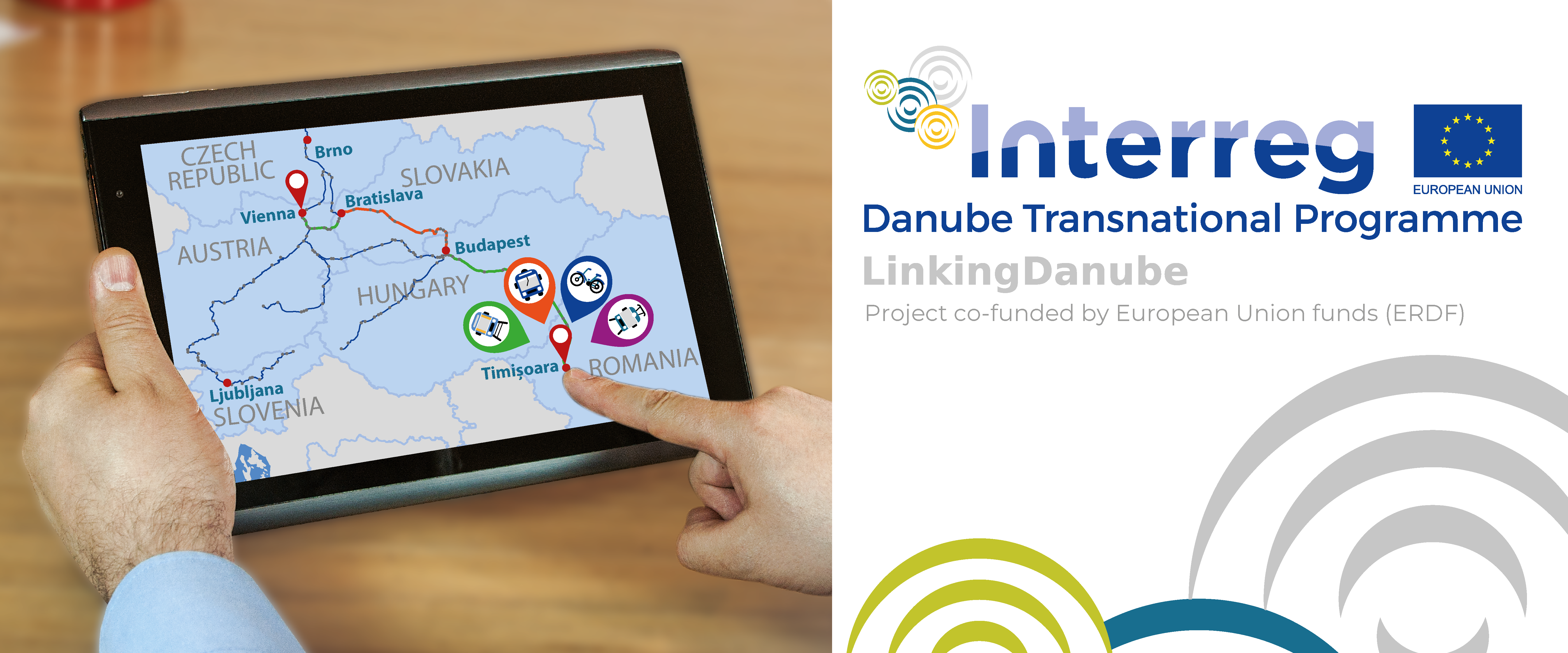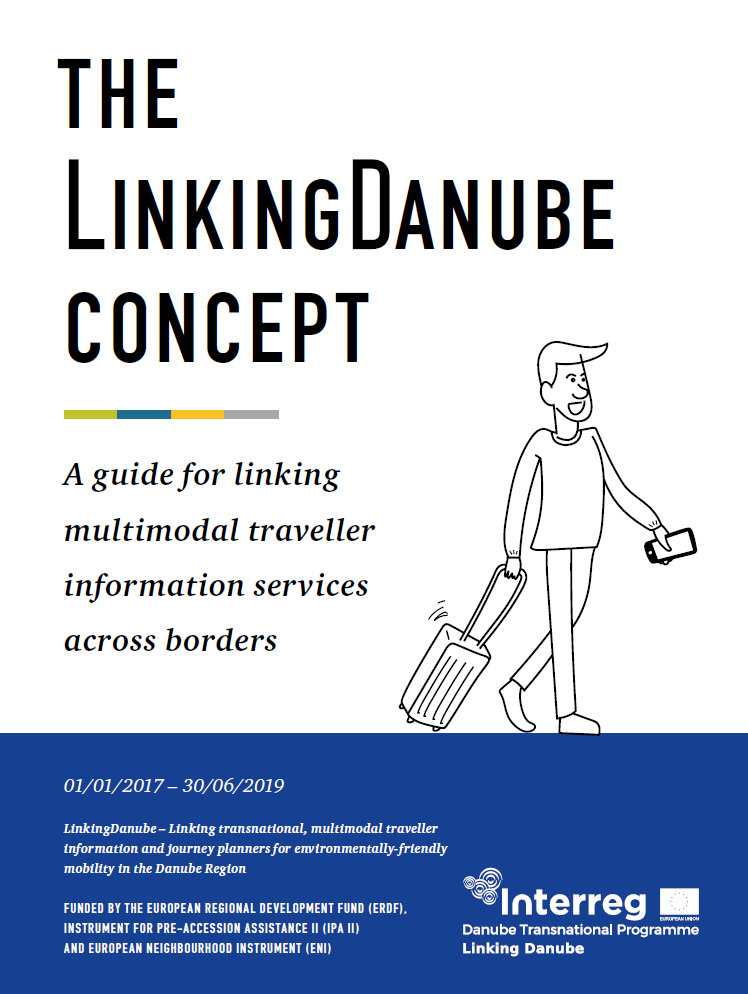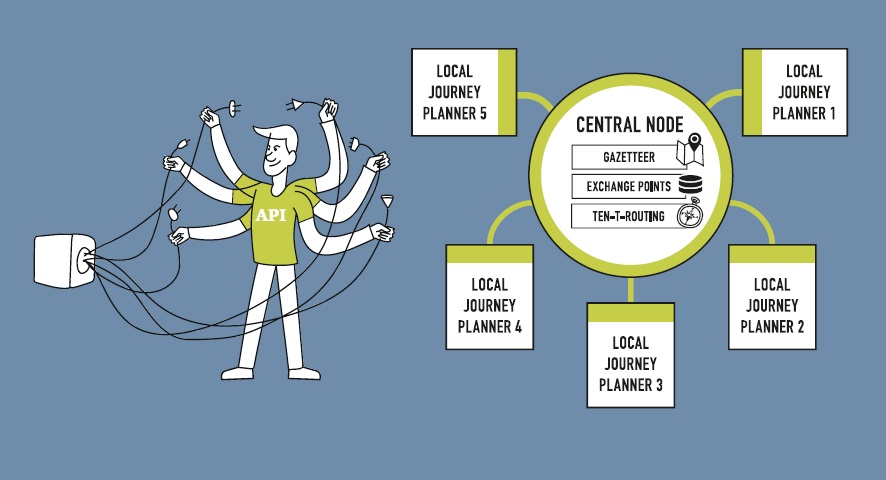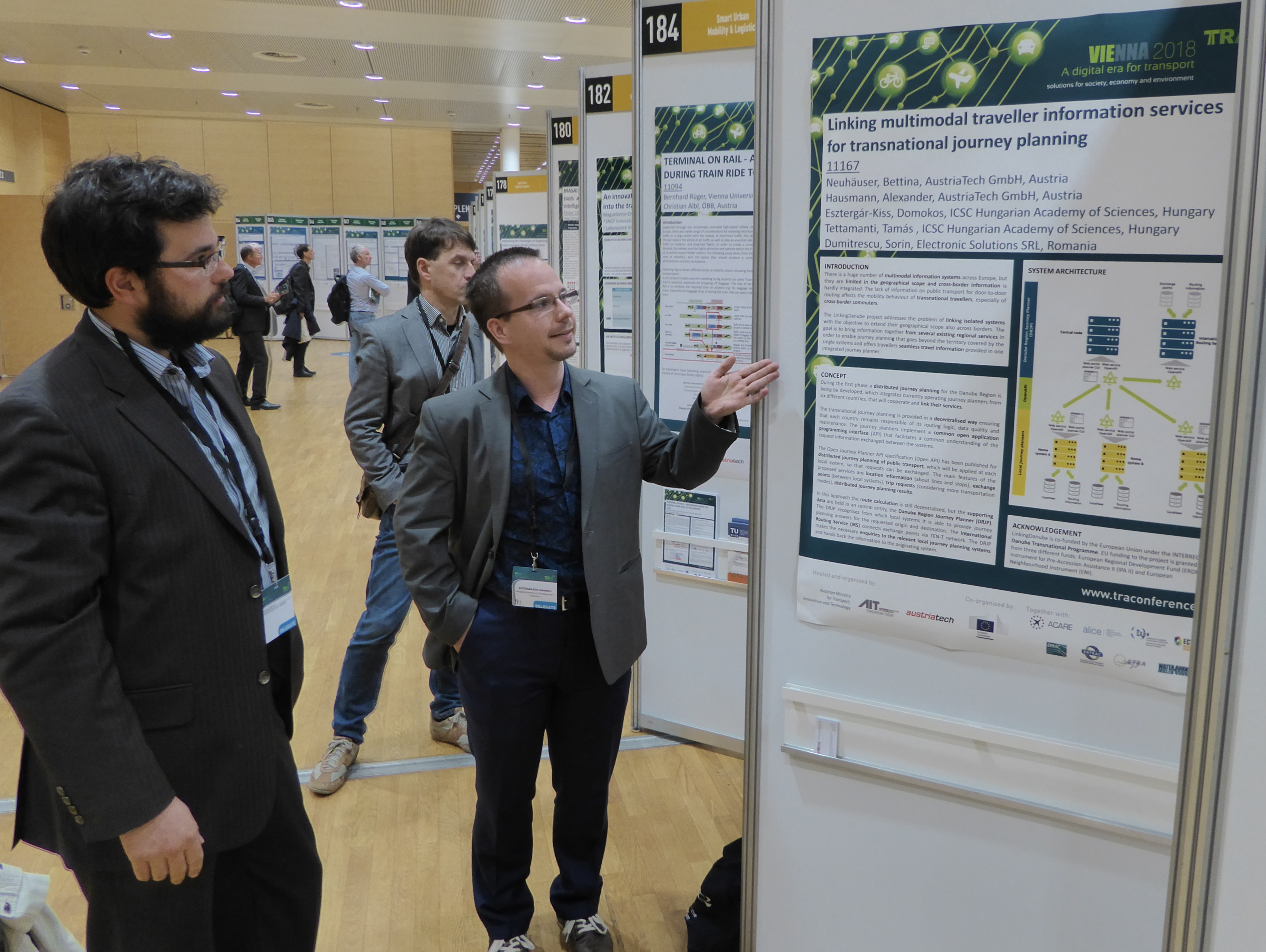|
|
| |
| |
 |
project activities highlight
|
| |
 |
| |
|
LinkingDanube is in the technical development phase/implementation phase of the Danube Region Journey Planner and has started the Pilot and Evaluation WP with the elaboration of a demonstration plan. Even more, the LinkingDanube Concept has been prepared as a brochure for knowledge exchange with project externals. In regard to exploitation and know-how transfer, LinkingDanube started to collaborate more intensively with ASPs and EUSDR. Particular events are planned for that purpose.
|
|
| |
 |
The Quality Indicators for the Distributed Journey Planning are finalised
|
| |
|
Quality management is an important aspect of the LinkingDanube project in order to ensure smooth implementation and sustainable results. In order to evaluate project quality, some Quality Indicators for system roll-out are defined.
The quality can be divided into the following five factors:
- Trustworthiness describes the ability of a system to maintain a certain level of performance under fixed conditions for a certain period of time.
- Usability means how easy it is to use, but also to learn how to use a software in relation to different user groups. This also includes aspects such as compliance with standards, conventions and so-called "style guides".
- Efficiency characteristic allows one to determine measurable results with regard to the duration and consumption of resources to fulfil a task.
- Modifiability includes the aspects of analysability, modifiability, stability and testability of a system in the course of changes.
- Transferability includes aspects of adaptability, insatiability, conformity and interchangeability. The transferability is very similar to changeability and the limits between the two factors.
For the Danube Region Journey Planner in particular the trustworthiness and the efficiency are keys. In regard to the distributed journey planning there is little knowledge on the efficiency (performance) of such a decentralised system. The efficiency and performance could be one of the critical cons of a distributed versus a centrally organised travel information system. Therefore, the performance is of particular interest for the developers and for the refinement of the communication architecture of the system.
Beside of the performance of the system, the quality of the results and hence the trustworthiness of the routing that the system outputs is highly relevant for the acceptance of the system by the users. In case of the Distributed Journey Planning System the main output of the system is the quality of the routing information that is provided.
The Quality Indicators categories for the Distributed Journey Planning are:
- Completeness
- System Functionality
- System Performance in terms of Efficiency
- System Performance in terms of Trustworthiness (Routing quality).
|
|
| |
 |
Output finalised !
LinkingDanube Concept - A guide for linking multimodal traveller information services across borders
|
| |
 |
| |
|
The first major output of the LinkingDanube project – the LinkingDanube Concept – is finalised and now available as a brochure to the general public. As transferability of the project results and approaches is one of the main premises in LinkingDanube, the brochure is targeted at giving project externals an overview on how linking services can actually be implemented in a multi-stakeholder environment. Following this transferability aspect, the intention of the brochure is to prepare the gained know-how in an understandable way in a first step and provide references and detailed documentation of the developed technical approach in a second step.
The brochure describes the technical and organisational concept for building up a transnational, multimodal travel information service linked across borders.
In particular, the brochure tackles the issue of linking multimodal traveller information services that are available within the regions and countries, thus creating the look and feel of one common system for the end users. In such a linked or “distributed” system, travel information and routes can be exchanged between the systems on demand. That way the coverage of one single system can be improved by requesting the information from other sources.

Besides strategic aspects, the brochure includes an outline of the system architecture of the distributed journey planning system and the applied interface. Detailed specifications and documentation will be available upon request and for free. Based on these specifications the actual development work is going on in the project. The so called “Danube Region Journey Planner” will be a pilot implementation of a distributed journey planning systems of six local travel information systems in the Danube Region. The local systems that are participating in linking services are Verkehrsauskunft Österreich (VAO), IDOS from Czech Republic, GLI Solutions from Hungary, Timisoara Journey Planner (TJP) from Romania, iKVC service from the Slovakian Railway Operators and AtoB Ljubljana from Slovenia.
You are kindly invited to read the LinkingDanube Concept brochure and to get in contact with us in case you are interested to learn more about the project. There are a series of events planned where externals are welcome! Please refer to section “Planned events” of this newsletter.
|
|
| |
 |
Recommendations for on-demand transport integration are out now !
|
| |
|
Apart from linking transport services within the core (TEN-T) network, the LinkingDanube project scope also includes connecting less accessible areas by integrating alternative mobility solutions, especially demand responsive transport (DRT). The deliverable ‘Recommendations for on-demand transport integration’ provides some practical advice on how to integrate these services.
In order to formulate recommendations for DRT integration, online surveys were conducted from the passengers’ side and personal interviews from the operators’ side in the participating countries. Based on the results of the analysis and the derived conclusions a number of organisational, technical and legal recommendations have been developed for the further improvement of on-demand transport services in the Danube Region.
In general, it can be stated that DRT is of interest for a number of potential passengers and should be therefore considered as additional travel option and alternative mobility service in the Danube Region, especially as substitution for missing public transport options. But DRT services should be defined according to the local needs, as surveys have shown not only national differences, but also widely varying user expectations regarding the type of trips to be served and the concrete target group. This leaves also room for different business models and strategic aspects considered by the operators.
Integration of DRT services into transnational journey planners has no technical barriers as the EU 00278420 public transport open API (TC 278) for distributed journey planning includes on-demand transport modes.
The recommendations formulated in the project have two aspects: on the one hand user expectations are similar whereas the organizational and legal backgrounds are different in the participating countries. The most important factors of using demand responsive transport services are travel and transfer times, however, some national differences exist. The full integration of DRT with traditional public transport is missing, no specific cross-border regulations exist, and the organizational background of DRT provision is also inhomogeneous.
This deliverable of the LinkingDanube project intends to add value to the inhabitants by connecting less connected areas and to help DRT operators in the Danube Region to plan and establish their services.
|
|
| |
 |
LinkingDanube presented at the Transport Research Arena 2018 (TRA 2018)
|
| |
The LinkingDanube team was present at Transport Research Arena 2018 conference in Vienna. This conference is one of the flagship conferences in Europe dealing with transport and mobility systems, where researchers, practitioners and industrial partners have the possibility to meet each other and discuss recent developments in the field of Intelligent Transport Systems. This year more than 3600 participants from 65 countries attended the events of the conference.
During the first day of the conference we had the opportunity to present the project with a poster titled „Linking multimodal traveller information services for transnational journey planning”.

The project partners provided information to interested participants about the basic concept, the elaborated system architecture and the planned pilots. The discussions provided further ideas to the implementation of the project and the exchange of experience with researchers in similar fields led to new insights on how to efficiently link multimodal travel services.
|
| |
 |
FIRST ASSOCIATED PARTNER MEETING WAS ORGANISED IN BRNO
|
| |
Associated Strategic Partners (ASP) are organisations whose participation is considered crucial for the added value given to the partnership. The ASPs in LinkingDanube declared their high interest in the results of the “LinkingDanube” project and they intend to support the activities of the consortium.
 |
|
The First Associated Partner Meeting of the LinkingDanube project was held in Brno, Czech Republic on 27th of June 2018. The partners were happy to welcome the ASP Knowledge Hub Moldova represented by Sergiu Porcescu.
|
|
|
The main focus of the meeting was to introduce to the ASP the LinkingDanube concept, which is the first important output of the project.The results of the WP4 work package, in particular the studies and investigations in the area of demand responsive transport, were also presented.
Knowledge Hub Moldova, a not-for-profit organization in Moldova, presented itself to the consortium. The organisation sees itself as a link between research and implementation and also promotes start-ups in the field of e-mobility and e-services, like mobile payment. It has also very close cooperation with the Ministry of Economy and fosters the policy impact of its projects. Some of the transport related projects were presented to the LinkingDanube consortium.
Katja Butina, leader of WP7, responsible for stakeholder integration, pointed out that ASP‘s involvement is crucial for developing, implementing and sustaining the outputs of the projects and that there is a specific action in WP7 on this topic. Proposals for an active involvement have been made.
Sergiu Porcescu also invited LinkingDanube project to participate at one of the national events in order to foster the impact and exploitation of LinkingDanube results, which was very welcomed by the consortium.
Sergiu Porcescu provided positive feedback to the developed concept and would be in favour to look for cooperation and take-up of the technical approach by stakeholders in Moldova.
| |
 |
UPCOMING EVENTS: LOCAL LEARNING AND DISSEMINATION WORKSHOPS AND STRATEGY WORKSHOP
|
| |
|
In each project country (Austria, Czech Republic, Hungary, Romania, Slovenia, Slovakia) a Local learning and dissemination Workshop will be held between January and March 2019, with relevant stakeholders and decision makers from policy level in each country. The workshops will explore issues like training on the implementation of the service, gaining political awareness and commitment on local and national level (including relevant associations for dissemination). This will create the learning necessary for a take of the developed API by third parties in a technical sense and exploitation of the concept from the policy level.
Local Workshops with a public event will be organized by project partners themselves in the different areas where the demonstrations are located to guarantee the optimal integration of the local actors. The explicit showcasing of the demonstration applications will give the public a hands-on feeling of what individual benefits they can expect from LinkingDanube and thus increase the positive perception of what can be achieved through EU-wide and transnational cooperation.
The strategy workshop will be combined with the final dissemination event in May 2018. It will comprise know-how transfer on the tool and concept as well as learning on interoperable and harmonized journey planners, on the API and linked services.
ASPs will actively participate in these dissemination events to ensure broad stakeholder involvement and acceptance of achieved results.
|
|
|
 |
CONTACT
|
| |
|
|
|
|
| |
|
If you have received this newsletter, you have been included on one or more of the Danube Transnational Programme/projects postal mailing lists. We are committed to respect and protect the privacy of personal data collected. We regard your personal data as confidential information and will never communicate it to third parties. Your personal data are used mainly for the express purpose of receiving the newsletter. Your mailing details may also be used by the DTP and its projects for information and dissemination purposes strictly related to the programme and its projects. If you prefer not to receive more of this newsletter and your data not to be used for dissemination purposes, you can unsubscribe by sending a reply email.
|
|
|
|
|
|
